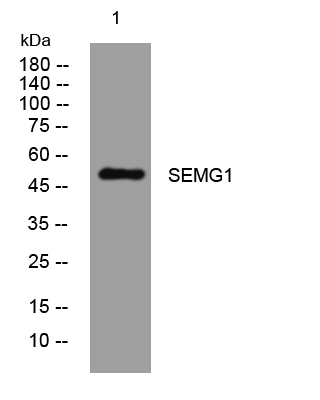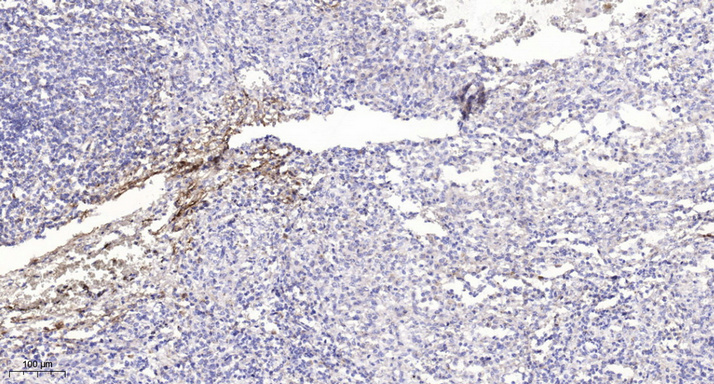SEMG1 rabbit pAb
- Catalog No.:YT7170
- Applications:WB;ELISA;IHC
- Reactivity:Human
- Target:
- SEMG1
- Gene Name:
- SEMG1 SEMG
- Protein Name:
- SEMG1
- Human Gene Id:
- 6406
- Human Swiss Prot No:
- P04279
- Immunogen:
- Synthesized peptide derived from human SEMG1 AA range: 224-274
- Specificity:
- This antibody detects endogenous levels of SEMG1 at Human
- Formulation:
- Liquid in PBS containing 50% glycerol, 0.5% BSA and 0.02% sodium azide.
- Source:
- Polyclonal, Rabbit,IgG
- Dilution:
- WB 1:500-2000;IHC 1:50-300; ELISA 2000-20000
- Purification:
- The antibody was affinity-purified from rabbit antiserum by affinity-chromatography using epitope-specific immunogen.
- Concentration:
- 1 mg/ml
- Storage Stability:
- -15°C to -25°C/1 year(Do not lower than -25°C)
- Molecular Weight(Da):
- 51kD
- Background:
- The protein encoded by this gene is the predominant protein in semen. The encoded secreted protein is involved in the formation of a gel matrix that encases ejaculated spermatozoa. This preproprotein is proteolytically processed by the prostate-specific antigen (PSA) protease to generate multiple peptide products that exhibit distinct functions. One of these peptides, SgI-29, is an antimicrobial peptide with antibacterial activity. This proteolysis process also breaks down the gel matrix and allows the spermatozoa to move more freely. This gene and another similar semenogelin gene are present in a gene cluster on chromosome 20. [provided by RefSeq, Feb 2016],
- Function:
- function:Alpha-inhibin-92 and alpha-inhibin-31, derived from the proteolytic degradation of semenogelin, inhibit the secretion of pituitary follicle-stimulating hormone.,function:Predominant protein in semen. It participates in the formation of a gel matrix entrapping the accessory gland secretions and ejaculated spermatozoa. Fragments of semenogelin and/or fragments of the related proteins may contribute to the activation of progressive sperm movements as the gel-forming proteins are fragmented by KLK3/PSA.,online information:Shackled sperm - Issue 62 of September 2005,PTM:Rapidly cleaved after ejaculation by KLK3/PSA, resulting in liquefaction of the semen coagulum and the progressive release of motile spermatozoa.,PTM:Transglutaminase substrate.,similarity:Belongs to the semenogelin family.,subunit:Occurs in disulfide-linked complexes which may also contain two less abundant 71- and 7
- Subcellular Location:
- Secreted.
- Expression:
- Seminal vesicle.
- June 19-2018
- WESTERN IMMUNOBLOTTING PROTOCOL
- June 19-2018
- IMMUNOHISTOCHEMISTRY-PARAFFIN PROTOCOL
- June 19-2018
- IMMUNOFLUORESCENCE PROTOCOL
- September 08-2020
- FLOW-CYTOMEYRT-PROTOCOL
- May 20-2022
- Cell-Based ELISA│解您多样本WB检测之困扰
- July 13-2018
- CELL-BASED-ELISA-PROTOCOL-FOR-ACETYL-PROTEIN
- July 13-2018
- CELL-BASED-ELISA-PROTOCOL-FOR-PHOSPHO-PROTEIN
- July 13-2018
- Antibody-FAQs
- Products Images

- Western blot analysis of lysates from KB cells, primary antibody was diluted at 1:1000, 4°over night

- Immunohistochemical analysis of paraffin-embedded human spleen. 1, Antibody was diluted at 1:200(4° overnight). 2, Tris-EDTA,pH9.0 was used for antigen retrieval. 3,Secondary antibody was diluted at 1:200(room temperature, 45min).



